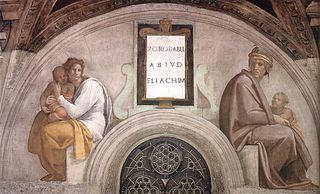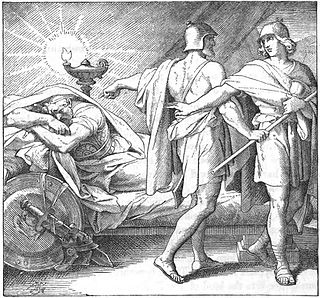Abijah is a Biblical Hebrew unisex name which means "my Father is Yah". The Hebrew form Aviyahu also occurs in the Bible.
The name Abda means servant, or perhaps is an abbreviated form of servant of YHWH. There are two people by this name in the Hebrew Bible.
Ebez also rendered Abez, was a town in the allotment of the tribe of Issachar, at the north of the Jezreel Valley, or plain of Esdraelon. F. R. and C. R. Conder (1879), believed that it was probably the ruins of el-Beida, but William Robertson Smith (1899) expressed doubt about this identification. According to the 1915 International Standard Bible Encyclopedia (1915), the location is not known. It is mentioned only in Joshua 19:20, where various manuscripts of the Septuagint render it as Rebes, Aeme, or Aemis. It is mentioned on the façade of the Mortuary Temple of Ramesses III at Medinet Habu as Apijaa.

Achsah, was Caleb ben Yefune's only daughter. The meaning of her name is courageous. In Biblical Names the meaning of the name Achsah is: Adorned, bursting the veil.
Adiel is a personal name meaning "ornament of God", or possibly "God passes by". It may refer to any of the following:
- The father of Azmaveth, who was treasurer under David and Solomon, mentioned only in 1 Chronicles 27:25.
- A family head of the tribe of Simeon, who participated in driving out the Meunim, mentioned only in 1 Chronicles 4:36.
- A priest mentioned only in 1 Chronicles 9:12, in the genealogy of Maasai.
Adonikam is a Biblical figure, one of those "which came with Zerubbabel". His "children," or retainers, numbering 666, came to Jerusalem (8:13). The name means, "the Lord is risen up." In the Septuagint, depending on the manuscript and location, the name is given as Adon[e]ikam,Adonikan,Adeikam,Adenikam,Adaneikam or Adoniakaim.
Adriel literally עדר (flock) י (of) אל (El) The meaning is "God is my Help" according to Holman Illustrated Bible Dictionary. He was a nobleman in the ancient kingdom of Israel.

Ahimelech, the son of Ahitub and father of Abiathar, but described as the son of Abiathar in 2 Samuel 8:17 and in four places in 1 Chronicles. He descended from Aaron's son Ithamar and the High Priest of Israel Eli. In 1 Chronicles 18:16 his name is Abimelech according to the Masoretic Text, and is probably the same as Ahiah.
Zerah or Zérach refers to several different people in the Hebrew Bible.

Matthew 1:13 is the thirteenth verse of Matthew 1 of the Gospel of Matthew in the New Testament. The verse is part of the section where the genealogy of Joseph, the father of Jesus, is listed. This verse covers the section somewhat after the Babylonian Captivity six generations before Jesus.

Matthew 1 is the first chapter of the Gospel of Matthew in the New Testament. It contains two distinct sections. The first lists the genealogy of Jesus from Abraham to his legal father Joseph, husband of Mary, his mother. The second part, beginning at verse 18, provides an account of the virgin birth of Jesus Christ.

In the Hebrew Bible, Nahshon was a tribal leader of the Judahites during the wilderness wanderings of the Book of Numbers. In the King James Version, the name is spelled Naashon, and is within modern Rabbinical contexts often transliterated as Nachshon.

The New Testament provides two accounts of the genealogy of Jesus, one in the Gospel of Matthew and another in the Gospel of Luke. Matthew starts with Abraham, while Luke begins with Adam. The lists are identical between Abraham and David, but differ radically from that point. Matthew has twenty-seven generations from David to Joseph, whereas Luke has forty-two, with almost no overlap between the names on the two lists. Notably, the two accounts also disagree on who Joseph's father was: Matthew says he was Jacob, while Luke says he was Heli.

Abishai was a military leader under the biblical King David. He was the eldest son of David's sister Zeruiah. According to Josephus his father was called Suri. The meaning of his name is "Father of a gift". He was the brother of Joab and Asahel,

Azor, according to the biblical narrative, was the son of Eliakim, and the great-grandson of Zerubbabel; he was also a member of the Davidic line. He was also the father of Zadok.

Eleazar (/ɛliˈeɪzər/; Hebrew: אֶלְעָזָר, Modern: ʼElʽazar, Greek: Ελεάζαρ, Eleázar. Was the son of Eliud ; A descendant of Zerubbabel and a member of the Davidic Line. Father of Matthan. Different from Eleazar.









